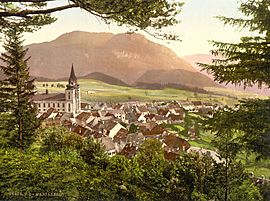Battle of Mariazell facts for kids
Quick facts for kids Battle of Mariazell |
|||||||
|---|---|---|---|---|---|---|---|
| Part of the Napoleonic Wars | |||||||
 Mariazell as it appeared around 1900 |
|||||||
|
|||||||
| Belligerents | |||||||
| Commanders and leaders | |||||||
| Units involved | |||||||
| III Corps (Grande Armée) | Merveldt's Corps | ||||||
| Strength | |||||||
| 3,800 | 4,000 | ||||||
| Casualties and losses | |||||||
| light | 4,000 16 guns |
||||||
The Battle of Mariazell was a fight that happened on November 8, 1805. It was part of the Napoleonic Wars, a series of big conflicts in Europe. In this battle, French soldiers attacked Austrian forces near the town of Mariazell, which is in Austria. The French won this battle.
What Happened at Mariazell?
The battle involved the French III Corps, a large group of soldiers led by Marshal Louis Davout. A part of this group, called the advance guard (the first soldiers to arrive), was led by Étienne Heudelet de Bierre. They faced an Austrian army led by Maximilian, Count of Merveldt.
The Austrian soldiers were already tired and discouraged from constant retreating. The French advance guard quickly defeated them. Many Austrian soldiers were captured, and they also lost 16 cannons.
Why Was This Battle Important?
This battle was part of the War of the Third Coalition. This war started badly for Austria with the Ulm Campaign. During that campaign, many Austrian armies were trapped and captured by Napoleon's main army, the Grande Armée.
Only a few Austrian groups managed to escape. One of these groups, led by Michael von Kienmayer, tried to get away to the east. They joined with some Russian soldiers and fought a rear guard action (a fight to protect the main army as it retreats) at the Battle of Amstetten a few days before Mariazell.
The Battle of Mariazell showed that the Austrian army was struggling. Their soldiers' spirits were low because they kept having to retreat.
What Happened Next?
After the Battle of Mariazell, the French army continued to advance. Just four days later, on November 12, 1805, the capital city of Austria, Vienna, was taken by the French without any fighting.
The main battle that would decide the outcome of the war was the famous Battle of Austerlitz. That big battle happened in early December of the same year.
 | Charles R. Drew |
 | Benjamin Banneker |
 | Jane C. Wright |
 | Roger Arliner Young |

